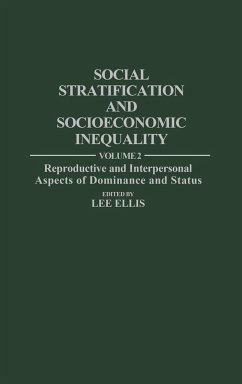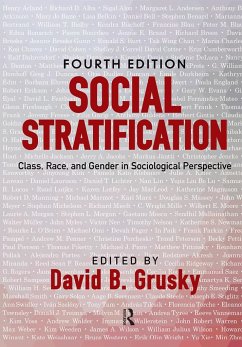
Social Stratification and Socioeconomic Inequality
Volume 1: A Comparative Biosocial Analysis
Herausgeber: Ellis, Lee
Versandkostenfrei!
Versandfertig in 1-2 Wochen
87,99 €
inkl. MwSt.

PAYBACK Punkte
44 °P sammeln!
This is the first book devoted exclusively to the study of social stratification from a biosocial perspective. The biosocial perspective explicitly assumes that both biological and social environmental factors are important for explaining behavior, including behavior surrounding the formation of hierarchies and unequal distribution of resources. In a variety of ways the contributors to this volume address the issue of how biological factors may interact with social experiences to affect social stratification. Chapters 1 and 2 present a detailed review of the issues surrounding how social strat...
This is the first book devoted exclusively to the study of social stratification from a biosocial perspective. The biosocial perspective explicitly assumes that both biological and social environmental factors are important for explaining behavior, including behavior surrounding the formation of hierarchies and unequal distribution of resources. In a variety of ways the contributors to this volume address the issue of how biological factors may interact with social experiences to affect social stratification. Chapters 1 and 2 present a detailed review of the issues surrounding how social stratification is defined and subdivided. Chapter 3 takes the reader back to the first six civilizations that evolved on earth and provides a historical picture of social stratification, which served the reproductive interests of a small proportion of males who wielded great political and economic power. In Chapter 4, the nature of social stratification in traditional Arab cultures is explored, and the author hypothesizes why different types of stratification systems may have evolved throughout the world. In Chapter 5, the authors provide evidence that genetics are among the factors that contribute to variations in income and wealth. Chapter 6 provides suggestions about how group differences in social stratification may have evolved. The authors contend that sexual selection may be at the heart of the evolution of social stratification, and present a theory as to how it may have happened. Chapter 7 also focuses upon sex as a central variable in social stratification, specifically, how sex hormones alter brain functioning and how these alterations underlie many of the tendencies that men and women have to gravitate toward different types of occupations. In Chapter 8, a general theory of social stratification is presented. It is offered as a specific alternative to the two strictly environmental theories that dominate: functionalist and conflict theories.














